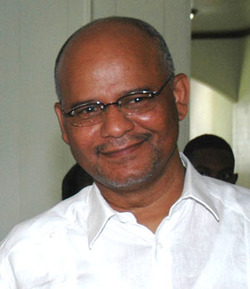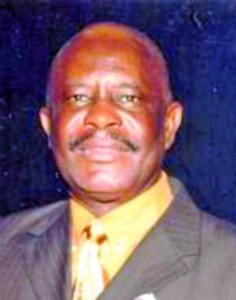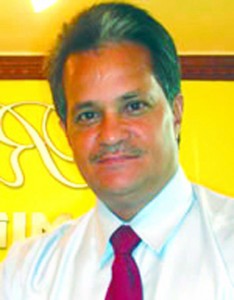Several years after Guyana had announced it was starting up a crime Stoppers’ programme, the initiative is yet to get off the ground.
Former Police Commissioner Winston Felix said the programme is a necessary component to reduce crime in Guyana, however, the “six years of gestation to get the programme operational” have severely crippled its momentum.

He also noted that the Police Security Industry Partnership (POLSEc), formally known as the Eyes and Ears Initiative headed by the Home Affairs Ministry and the various private security firms, was just as necessary because information should be shared at all levels to help prevent crime.
“We need to get people involved,” Felix said, adding “just as we did in the 1970s with community policing, we need to hand it over to the commissioner of police”. He was critical of the crime Stoppers’ programme, noting that it was unable to get further than just the original talks.
“All of these programmes are good, but they are only as good as the results they yield.” The former police commissioner also said though the Home Affairs Ministry has responsibility to develop policies, it should refrain from actively involving itself when work commences.
“What you want is a strong and effective police force,” Felix said, contending that is the responsibility of the commissioner. He pointed out the private security services have been supportive, but are limited. POLSEc, he said, cannot be a nationwide programme, because the security initiative is based in Georgetown and surrounding areas.
Meanwhile, member of the Law and Order commission, Gerry Gouveia stated that the crime Stoppers’ and POLSEc came at a time (2004-2006) when Guyana was experiencing high levels of violent crime. He continued that “there was an urgency to deal with the crime, but now there is a sense that the police force can handle” the vast majority of criminal activities.
“In the beginning, a lot of paperwork was completed,” Gouveia told Guyana Times International, “The lack of enthusiasm in the private sector and the minister of home affairs is the problem.” He said there were somewhere between 15,000 to 20,000 private security workers in Guyana, and a programme like POLSEc is very realistic in Guyana.

“POLSEc doesn’t need money, it could be a requirement for getting a security licence that firms should know they would be required to assist the police force when they have outstanding information,” he said.
Gouveia admitted that the original idea behind crime Stoppers’ was that the start-up capital would come from the private sector, but he also stated that the Home Affairs Ministry need stronger leadership to initiate the process.
In September 2011, the Home Affairs Ministry, the Guyana Police Force and the Private Sector commission recommitted themselves to the proposed crime Stoppers’ programme, however it is now March 2012 and the programme is yet to gather its footing.
Home Affairs Minister clement Rohee insisted that this programme is still a viable option, but stated that no progress has been made because of lack of financial support. “No progress because no funding. The private sector, that’s where the money was supposed to come from,” the minister stated. He noted that the government is “fully prepared to contribute”, but the initial start-up was the sole responsibility of the Private Sector commission.
Several years after Guyana had announced it was starting up a crime Stoppers’ programme, the initiative is yet to get off the ground. Former Police Commissioner Winston Felix said the programme is a necessary component to reduce crime in Guyana, however, the “six years of gestation to get the programme operational” have severely crippled its momentum.He also noted that the Police Security Industry Partnership (POLSEc), formally known as the Eyes and Ears Initiative headed by the Home Affairs Ministry and the various private security firms, was just as necessary because information should be shared at all levels to help prevent crime.“We need to get people involved,” Felix said, adding “just as we did in the 1970s with community policing, we need to hand it over to the commissioner of police”. He was critical of the crime Stoppers’ programme, noting that it was unable to get further than just the original talks.“All of these programmes are good, but they are only as good as the results they yield.” The former police commissioner also said though the Home Affairs Ministry has responsibility to develop policies, it should refrain from actively involving itself when work commences.“What you want is a strong and effective police force,” Felix said, contending that is the responsibility of the commissioner. He pointed out the private security services have been supportive, but are limited.

POLSEc, he said, cannot be a nationwide programme, because the security initiative is based in Georgetown and surrounding areas.Meanwhile, member of the Law and Order commission, Gerry Gouveia stated that the crime Stoppers’ and POLSEc came at a time (2004-2006) when Guyana was experiencing high levels of violent crime. He continued that “there was an urgency to deal with the crime, but now there is a sense that the police force can handle” the vast majority of criminal activities.“In the beginning, a lot of paperwork was completed,” Gouveia told Guyana Times International, “The lack of enthusiasm in the private sector and the minister of home affairs is the problem.” He said there were somewhere between 15,000 to 20,000 private security workers in Guyana, and a programme like POLSEc is very realistic in Guyana.“POLSEc doesn’t need money, it could be a requirement for getting a security licence that firms should know they would be required to assist the police force when they have outstanding information,” he said.Gouveia admitted that the original idea behind crime Stoppers’ was that the start-up capital would come from the private sector, but he also stated that the Home Affairs Ministry need stronger leadership to initiate the process.In September 2011, the Home Affairs Ministry, the Guyana Police Force and the Private Sector commission recommitted themselves to the proposed crime Stoppers’ programme, however it is now March 2012 and the programme is yet to gather its footing. Home Affairs Minister clement Rohee insisted that this programme is still a viable option, but stated that no progress has been made because of lack of financial support. “No progress because no funding. The private sector, that’s where the money was supposed to come from,” the minister stated. He noted that the government is “fully prepared to contribute”, but the initial start-up was the sole responsibility of the Private Sector commission.



